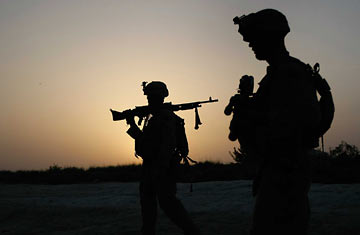
U.S. Marines conduct an operation to clear a village of Taliban fighters in Mian Poshteh, Afghanistan
President George W. Bush, eight years ago today, in his first press conference after launching the Afghan war, conceded he didn't know when the conflict would end. "People often ask me, 'How long will this last?' " he said 96 hours after the invasion began. "It may happen tomorrow, it may happen a month from now, it may take a year or two, but we will prevail." Three weeks into the war, New York Times reporter R.W. Apple wrote that "the ominous word quagmire has begun to haunt conversations" in Washington about the conflict. Defense Secretary Don Rumsfeld had little time for such grousing. "I must say that I hear some impatience from the people who have to produce news every 15 minutes," he said as the first month's fighting neared its end, "but not from the American people."
Bush is no longer President, Rumsfeld no longer Defense Secretary; R.W. "Johnny" Apple is dead, and so are nearly 900 U.S. troops killed in Afghanistan — 239 of them this year alone. And most Americans have run out of patience with the war, modestly begun eight years ago to overthrow the Taliban regime that had harbored Osama bin Laden and al-Qaeda before 9/11. That goal seemed to have been achieved seven years and 11 months ago, when the Taliban were driven from Kabul. But the U.S. and its allies have waged an inconclusive war against the Taliban and their al-Qaeda allies ever since. President Barack Obama is being asked by his generals to commit more troops to Afghanistan at a moment when fewer than 1 in 3 Americans supports that option.
Afghanistan is Obama's war now, so branded after he approved dispatching 21,000 more U.S. troops into battle earlier this year, a move that will raise the U.S. troop level there to 68,000 next month. He also tapped Army general Stan McChrystal as his new Afghan commander to develop a new strategy to win the war. But McChrystal found the security situation there in a dangerous decline, and says he needs 40,000 additional U.S. troops to have the best chance of turning things around. Obama's inner circle is having doubts over whether the President should approve that request.
Obama will meet behind closed doors for three hours with his Afghan-war advisers on Wednesday. They held a similar session last Friday, and have scheduled a third one for Friday. "My assessment, having been a participant in this, has been that we've had ample opportunity to provide our best professional military advice," Army general David Petraeus, chief of the U.S. Central Command overseeing the Afghan war, told an Army audience Tuesday. "General McChrystal has been participating in these by video teleconference." Afghanistan, he added, "requires a sustained substantial commitment." But, perhaps more politically astute than McChrystal — who called publicly for reinforcements in Afghanistan Oct. 1 — Petraeus quickly added, "I'm not going to get into whether that means more or less or, you know, what number of forces, enablers, trainers and civilians."
President Bush faced a similar conundrum in Iraq two years ago. In the face of strong doubts from Congress and the U.S. military, he ordered a "surge" of nearly 30,000 more troops in and around Baghdad, and their deployment helped calm the country. But there were a couple of differences: first of all, Iraq was Bush's war and he was in danger of losing it. Perhaps more importantly, Bush was nearing the end of his second term, meaning — electorally, at least — he had nothing to lose by upping the ante.
Obama is in the first year of his first term, and will almost certainly run again in 2012. If Afghanistan is the same sucking chest wound that it is today three years from now, voters are unlikely to grant that wish. But he wouldn't want to face an electorate that had been persuaded that he had "lost Afghanistan." So, amid all the cacophony of conflicting advice about what to do in Afghanistan, Obama's going to have to make this decision all by himself.
It's really pretty simple: if he believes McChrystal can turn things around by getting all the troops he seeks, Obama will agree (most likely minus a small Commander in Chief tax to show who's really in charge). But if McChrystal can't promise something resembling success by 2012, look for Obama to shift to a more modest strategy, with more modest goals, and paint it as realism rather than retreat.
